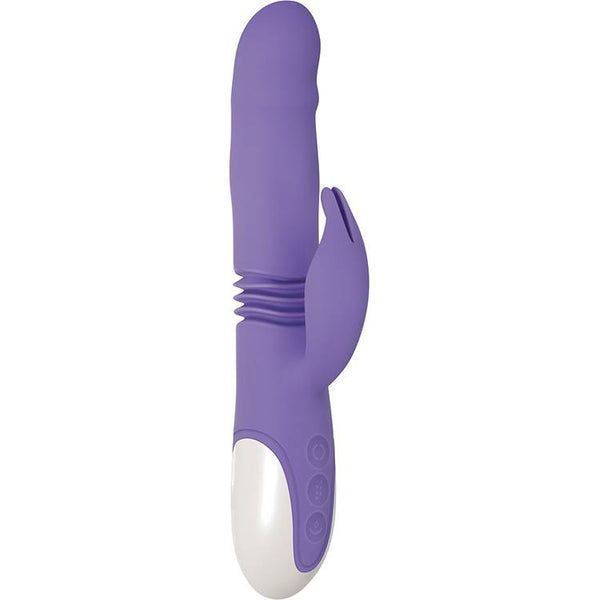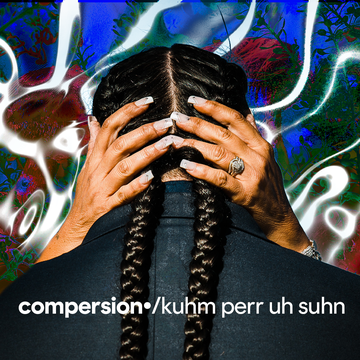Good sex (whether it’s sex with yourself or sex with a partner) is one of life’s greatest pleasures, followed closely by petting puppies and uncorking a fresh bottle of your favorite wine. But if you find yourself feeling anxious, angry, or dissatisfied about the amount of sex you’re not having, you’re not alone. It turns out, sexual frustration is a very real thing, and it’s much more common than you might think.
While the term sexual frustration isn’t an “official” diagnosis in the Diagnostic and Statistical Manual of Mental Disorders (DSM), sex and relationships therapist Emily Jamea, PhD, says many people experience it at some point in their lives. “[Sexual frustration] is characterized by feelings of dissatisfaction, anxiety, anger, and even depression due to unmet sexual needs,” Jamea explains. It occurs when “you have an expectation around sex and it’s not fulfilled according to that expectation,” adds Marla Renee Stewart, a sexologist and sexpert for Lovers sexual wellness brand and retailer.
Since people’s wants, needs, and desires ebb and flow throughout their lives, it makes total sense that you could find yourself feeling sexually frustrated at one point or another. Maybe you’re entering a phase where you desire more intimacy, maybe your partner needs less physical connection than you do, or maybe you just have a hankering for more oral sex all of a sudden (love that for you). Whatever it is, if your sexual needs aren’t met, feeling sexually frustrated is a very real result, so your feelings are valid.
But don’t worry—whether you’re the one aching for more sex or your partner’s desires are outweighing your own, we’ve got solutions! From how to spot it to how to remedy it, we spoke to the pros to bring you everything you need to know about sexual frustration.
What actually is sexual frustration?
Since sex and emotional intimacy can often go hand in hand, if someone feels an imbalance between their sexual needs and their actual sexual fulfillment, they can begin to feel sexually frustrated. “Sex is an opportunity for self-expression, emotional connection, and physical pleasure,” says Jamea. “People who feel sexually frustrated often describe feeling lonely and isolated within the relationship.”
While sexual frustration can happen to people of all genders, Jamea notes it can manifest itself a lil differently in everyone. Typically for cis women, sexual frustration occurs due to their partners not knowing how to please them or being unwilling to experiment sexually, she explains. And while you might think blue balls = sexual frustration for people with penises, that’s not exactly true. Jamea says sexual frustration is more of an “emotional state,” while blue balls is a fleeting physical feeling when someone with a penis experiences sexual excitement without a release.
Related terms:
Why do people feel sexual frustration?
There’s not one clear-cut reason why people feel sexual frustration because everyone is different and it can be caused by a wide variety of factors. But the most common, Jamea explains, is “when two people in a relationship experience a discrepancy in their desire for sex.”
If one person has a significantly higher sex drive than their S.O., it could result in the person with the higher sex drive feeling sexual frustration because their partner just doesn’t want to have sex as often or in the same way. On the flip side, if your partner isn’t learning—or isn’t *willing* to learn—your sexual likes and dislikes, even if you’re having sex every day, it can also be easy to experience sexual frustration. “Sexual compatibility is important,” Jamea explains. “We have a plethora of research indicating a strong link between sexual satisfaction and relationship satisfaction.”
But people in relationships aren’t the only ones who experience sexual frustration—single people feel it just as much. Jamea says mental health professionals saw an increase in unattached sexual frustration during the pandemic, when people weren’t able to date or have sex as often as they could before. This isn’t a couples-only curse, but don’t worry, there is a cure.
Remember: Sexual frustration isn’t just about the act of having sex but also about the intimacy behind the sex as well. “People can masturbate to take care of the physical element but only a partner can satisfy the emotional component,” explains Jamea.
How to recognize sexual frustration
Sexual frustration can manifest similarly to everyday frustration. Those stuck-in-traffic, late-for-work, short-fuse vibes are typically how people who are sexually frustrated feel too. And while sexual frustration can look like many things, Stewart says a few signs you might be struggling with it include:
- A new lack of sex and intimacy in your life and/or relationship.
- You feel more in your head, especially when you do have sex.
- You don’t experience as much pleasure when you have sex with a partner and/or solo.
- You don’t have an orgasm (even though you have in the past) when having sex.
- You have overwhelming thoughts about sex, especially at inappropriate times.
- You feel a lack of focus and have trouble concentrating on everyday activities.
- You feel emotionally and/or physically distant from your partner.
- You get mad at your partner for small, seemingly insignificant things.
- You try to initiate sex much more often than it’s reciprocated, or you no longer initiate sex at all.
- You turn down sex with your partner much more often, or you no longer initiate sex because you know it won’t be pleasurable.
- Your partner is unwilling to learn how to please you sexually.
In addition to the above, Jamea says people with sexual frustration often feel an overall sense of malaise. “Studies find a strong link between sexual satisfaction and feeling that one’s life is meaningful, happiness, physical health, mental health, sleep quality, and relationship satisfaction,” she explains. “If you find that you’re struggling in any one of these areas, sexual frustration may be to blame.”
What are the consequences of sexual frustration?
As you might have guessed, sexual frustration doesn’t feel good for anyone. Not only are your sexual needs not being met, but it can be tough on your body in tons of other ways too.
When someone is sexually frustrated, there’s often “a release of the stress hormone cortisol, which can cause fatigue, irritability, anxiety, depression, high blood pressure, constipation, or sexual problems such as anorgasmia, erectile dysfunction, or reproductive issues,” explains Stewart. Furthermore, she adds, you might feel “emotional distress, especially with your lover.”
How do you deal with sexual frustration?
The good news is, if sexual frustration is making you all types of stressed, there are plenty of ways to manage it—both short-term and long-term.
If you’re experiencing sexual frustration:
First and foremost, Jamea stresses the importance of being mindful in how you express your feelings to your partner. While communication is essential, shaming your S.O. about their lower desire levels (compared to your own) is not only not okay, but it also won’t help either of you. “Make sure to tell [your partner] you want more emotional connection and intimacy,” she explains. “Making it more about the physical release can make your partner feel objectified.”
In the short term, Stewart suggests using that pent-up sexual energy toward something else like exercise, masturbation, or a physical activity you enjoy. This can allow your body to release endorphins and make you feel better—and more clear-headed—going into conversations and interactions with your partner.
And when you do sit down to chat, make sure to keep an open mind and be understanding, says Stewart. “Talk through your feelings and reassure [your partner] they’re loved and that you can work together to ensure you’re on the same page.”
If your partner is experiencing sexual frustration:
Hearing that your partner feels sexually frustrated can easily set off your internal alarm and make you feel like it’s all your fault, but before you spiral, take a deep breath. Jamea advises folks to actively listen and empathize with their sexually frustrated partner before panicking. “It can feel vulnerable to admit to feeling lonely in the relationship due to unmet sexual needs,” she explains. “Couples need to work together to tend to the erotic part of their relationship as much as the emotional and friendship parts.”
While a common solution may be to decide on a number of times per week or month you’ll have sex, Jamea says that might not work for everyone. “People in relationships need to first understand what may be causing the discrepancy. Is the higher-desire partner over-relying on sex to relax or feel validated in the relationship? Is the lower-desire partner feeling too stressed out to relax enough to get in the mood? Collaborating to understand and work with what influences each other’s sexual desires can go a long way in minimizing the difference.”
To move forward, Jamea suggests focusing on enhancing the quality versus the quantity of sexual interactions between you. “Sexual satisfaction usually has more to do with how enjoyable the sexual experience is than it does with how often you do it,” she explains. This is where the help of a sex therapist can come into play. The right trained professional can help you and your partner better align yourselves with each other’s sexual goals and desires.
If therapy isn’t an option for you, you could try pleasure mapping, exploring tantric sex, or using different sex toys to enhance your sexual experiences. This can make it easier to focus on the emotional connection that the sexually frustrated partner likely craves, Jamea says.
But above all, it’s important to be kind to yourselves. Sexual frustration is very common, and as our bodies go through changes (like, oh, I don’t know, the stress of a years-long global pandemic, burnout, different phases in your relationships…you get the picture), we simply might desire something different than before, Stewart says. “We just need to adjust accordingly.”
Rachel Varina is a full-time freelance writer covering everything from the best vibrators (the Lelo Sona) to the best TV shows (The Vampire Diaries). She has over 10 years of editorial experience with bylines at Women's Health, Elite Daily, Betches, and more. She lives in Tampa, Florida, but did not feed her husband to tigers. When she's not testing out new sex toys (100+ and counting so far!), she's likely chilling with her dogs or eating buffalo chicken dip. Ideally at the same time. Follow her on Instagram and Twitter.














